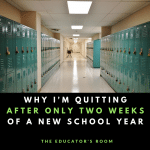This post originally appeared May 23rd on Teacher Pop:
[fusion_builder_container hundred_percent=”yes” overflow=”visible”][fusion_builder_row][fusion_builder_column type=”1_1″ background_position=”left top” background_color=”” border_size=”” border_color=”” border_style=”solid” spacing=”yes” background_image=”” background_repeat=”no-repeat” padding=”” margin_top=”0px” margin_bottom=”0px” class=”” id=”” animation_type=”” animation_speed=”0.3″ animation_direction=”left” hide_on_mobile=”no” center_content=”no” min_height=”none”]
One of my favorite things about fall is following the Green Bay Packers. The season always begins on a high note, but ends with everyone banged up. Regardless, I know my Packers have time to recover and improve before the next season. And just as professional athletes need time off to learn from the past and prepare for the following season, teachers need a summer break to recover and improve their craft for the coming year.
After all, teaching has more in common with full-contact sports than just about any other profession. Both professions are more lifestyles than jobs. Athletes gear every action to improving their performance, and teaching is no different: it takes someone special to lead a room full of kids through a lesson on Napoleon or conic sections and then go home and spend countless hours working to improve their craft. We have little time to rest and recuperate, or for in depth-reflection and change.
This leads me to the first reason that teachers need a summer break: to improve their craft. Pro athletes use the off-season to work on their speed, agility, and fine motor skills. Many teachers similarly work to develop themselves during our off-season. Some of us take graduate school classes to improve our education pedagogy. Others attend conferences and professional development courses in other states to learn and collaborate with colleagues. Still others prefer to work on their own by spending the time planning and revising their units and reflecting on the past year to determine what can be done better.
We also need a summer break because we need time to pursue our own interests. Teaching is a lifestyle and it consumes you heart, mind, and soul for nine months out of the year. That means that unlike in other professions, we can’t just take a week off for vacation–that much time away has the potential to derail an entire quarter’s work in a class. Our kids would get behind, and that’s simply not something we could accept.
Summer, then, gives us time to do the things that we can’t do the rest of the year. It gives us time to take that vacation. To travel the world. To make that medical appointment we’ve been putting off for eight months. To fix up the house. (Athletes are no different in their off-season. Some volunteer. Others start charities. One of my favorite players of all time, Reggie White, pursued his interests as a minister during his off-season.)
Finally, we need a summer break simply to recover and reenergize for the coming year. Almost all professional athletes have something that’s bothering them at the end of the season, and teachers are no different. We’ve “played” through 180 days (more “work days” than any professional athlete, I might mention!) and have given our all in each and every one of them. Many of us work late hours and weekends helping our kids find their way into great summer programs, preparing them for state tests, or taking them on college tours. And we need a break. We cannot continue to work at our best if we are unable to recover. Nobody functions at their best in such a rigorous profession without a prolonged period of rest and recuperation.
So what am I doing this summer? First, I’ll be taking a long-needed vacation by traveling to France with my wife (also a teacher!) with several of our students to expose them to a completely different culture and way of life. When I return, I’ll be volunteering with a political campaign by helping with social media, something I cannot do during the regular school year. During this time I’ll also be working with a colleague of mine to refine my geometry units and lessons for the coming year by implementing more Common Core-aligned activities. I’m also looking forward to spending time with friends and family, and starting to train for my first-ever half marathon!
The off-season is a time for athletes to recover from the season and prepare for the next one. Summer break provides the same time for teachers and empowers us to improve, recover, and pursue other interests. In such an all-consuming profession, summer break should be viewed for what it is: a professional necessity for reaching our full potential.[/fusion_builder_column][/fusion_builder_row][/fusion_builder_container]





Leave a comment